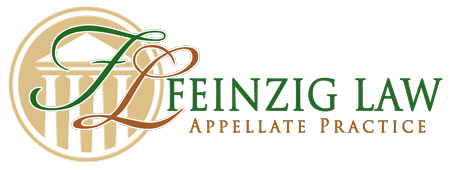
The law firm of Michele K. Feinzig, P.A. handles civil appeals in Florida state courts and the federal United States Court of Appeals for the Eleventh Circuit, on behalf of parties wishing to appeal a lower court’s adverse ruling and parties that must defend an appeal filed by the opposing party. The firm also handles extraordinary writ proceedings, such as Petitions for Writ of Certiorari and Petitions for Writ of Prohibition.
Appeals can only be taken from final orders or judgments, and certain non-final orders. Consequently, the first thing that must be done before an appeal is filed is determining whether an order is appealable. To make that determination, Attorney Michele K. Feinzig will carefully review your order, and the applicable Rules of Appellate Procedure and relevant case law. If an order is not appealable, she will evaluate whether extraordinary relief may be sought. Ms. Feinzig is well-versed in making these determinations, having handled in excess of 100 appeals, and evaluated the appealability of countless orders.
Attorney Feinzig will also analyze your case to determine the standard of review by which the appellate court will review the case, and the likelihood of prevailing on appeal. Ms. Feinzig will provide a thorough, honest assessment, so that potential clients can make an informed decision whether to seek appellate review.
Once clients decide that they do want to seek review in the appellate court, or if the opposing party has filed an appeal that must be defended, Ms. Feinzig will fully handle the appeal, from ensuring the Record on Appeal is complete, to analyzing the Record to determine the best issues for appeal, researching the law on those issues, preparing and filing written appellate briefs and other documents necessary for the appeal, and presenting oral argument if it is scheduled by the appellate court.
While Ms. Feinzig handles each and every aspect of the appellate process with the utmost care, she concentrates her efforts on brief writing, which is undoubtedly the most important part of the process. An appellate brief presents to the court the relevant facts of a case, and argument demonstrating how the law applied to those facts warrants a decision in a party’s favor. Since appeals are decided largely, and in many cases entirely, on the briefs, they must not only be accurate and concise, but compelling and convincing. They should also be written in a way that captures the attention of appellate judges, who are burdened with heavy caseloads. Ms. Feinzig prides herself on her excellent writing skills and puts every effort into writing persuasive briefs that aim to convince the appellate court to rule in her client’s favor.
